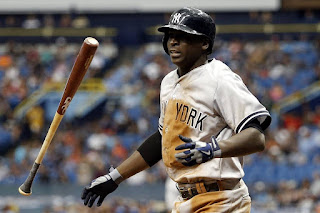Who wore number two before Derek Jeter?
With Derek Jeter’s
jersey number being retried Sunday night, no New York Yankee baseball player will ever again
sport number two. Jeter’s number will be a part of a long list of retired
Yankees’ numbers and will be the last single digit number to be retired in the
organization. It is pretty clear as to where the future of number two stands.
It will not be on the back of a Yankee player. What happened before Jeter, however? The
number two did in fact belong on the backs of other players before Jeter. While
no one who wore the number came close to Jeter’s credentials, there are a few
notable names and a bit of interesting history.
The son of
Yankee legend Yogi Berra, Dale Berra wore number two from 1985-1986. Dale was
an infielder and was acquired from the Pirates, while his father was still
managing the team. Dale was the first player to play for his father since
Connie Mack managed his son Earle in the late 1930s. Yogi was fired sixteen
games into the 1985 season and his replacement, Billy Martin, regulated Dale
Berra to bench duties. Berra’s most memorable moment in pinstripes was when he
and Bobby Meacham were both tagged out by Carlton Fisk at home plate a second
apart for a double play. Berra went on to be accused of distributing cocaine
and has since ran a construction business. Dale Berra played the most major
league games of any MLB Hall of Famer’s son.
Red Rolfe
Red Rolfe is the
longest tenured owner of the jersey number other than Jeter and arguably was
the most successful other than him as well. Rolfe was a part of the dynasty of
the 1930s. He played third base, was a four-time all-star, and led the league
in hits, runs, and doubles in 1939. The five-time World Series winner was a
graduate of Dartmouth College and coached baseball and basketball at Yale, following his playing career. Rolfe died in 1969, due to Kidney Disease.
Bobby Murcer
Bobby Murcer
played thirteen seasons in the majors with the Yankees and was broadcaster for
them for much of his post-playing career. Murcer had an above average career in
the majors making five all-star appearances and winning a gold glove. Unfortunately,
Murcer wore number one during his first stint in New York and did not put up
great numbers, when he wore two from 1980-1983. Despite the poor play, Murcer
was more than worthy of wearing number two as he was regarded as an amazing
member of the baseball community. When he passed in 2008, Yankees’ owner George
Steinbrenner said, "Bobby Murcer was a
born Yankee, a great guy, very well-liked and a true friend of mine. I extend
my deepest sympathies to his wife Kay, their children and grandchildren. I will
really miss the guy." Bud Selig also had strong praise for Murcer stating, "All of
Major League Baseball is saddened today by the passing of Bobby Murcer,
particularly on the eve of this historic All-Star game at Yankee Stadium, a
place he called home for so many years. Bobby was a gentleman, a great ambassador
for baseball, and a true leader both on and off the field. He was a man of
great heart and compassion." Derek Jeter attended his funeral in Oklahoma
City.
Snuffy Stirnweiss
Chances are most
people have probably never heard of Snuffy Stirnweiss unless they searched for
funny major league player names or are experts in baseball players during the
World War II era. Stirnweiss was an interesting player in his time
in pinstripes and wore two from 1943-1944. He was close to giving up on
professional baseball, until Joe Gordon enlisted in the military resulting in a
vacated second base position in the Yankees’ lineup. After a rookie year where
he batted a dismal .219, Stirnweiss came out of nowhere and became an MVP candidate.
In 1944, he led the league in runs, hits, triples, and stolen bases. By modern
standards, his stats accumulated to a WAR of 8.5. To put that into perspective
only Mike Trout and Mookie Betts in 2016, put up better numbers than Stirnweiss.
Stirnweiss would enjoy a successful 1945 season, but then fell off completely
at only twenty-seven years old. He would never bat above .260 for the rest of
his career nor lead the league in any offensive categories ever again. Stirnweiss
would go into banking and passed away at age thirty-nine when a train heading towards
Manhattan, that he was a passenger of, flew off an open lift bridge and into the Newark
Bay.
Mike Gallego
Mike Gallego did
next to nothing in his short three-year stint with the Yankees, serving
primarily as a backup infielder. His most significant contribution to Yankees’ history
is that he was the last player to wear number two, before Jeter donned it for
the first time. Gallego hit nineteen of his forty-two career home runs in New
York and holds the record for the most hits in a season without recording an
extra base hit of twenty-eight.
Other players to wear two: Mark Koenig, Yats Wuestling, Lyn Larry,
Frankie Crosetti, Jerry Kenney, Matty Alou, Sandy Alomar, Paul Blair, Darryl Jones,
Tim Foli, and Wayne Tolleson
Article by: Ryan Thoms
Follow @_TheRealRT_Article by: Ryan Thoms
Follow @BronxBomberBall






Wow! This is such a great combination of both themes. Fantastic work!! Vintage e car plate
ReplyDelete